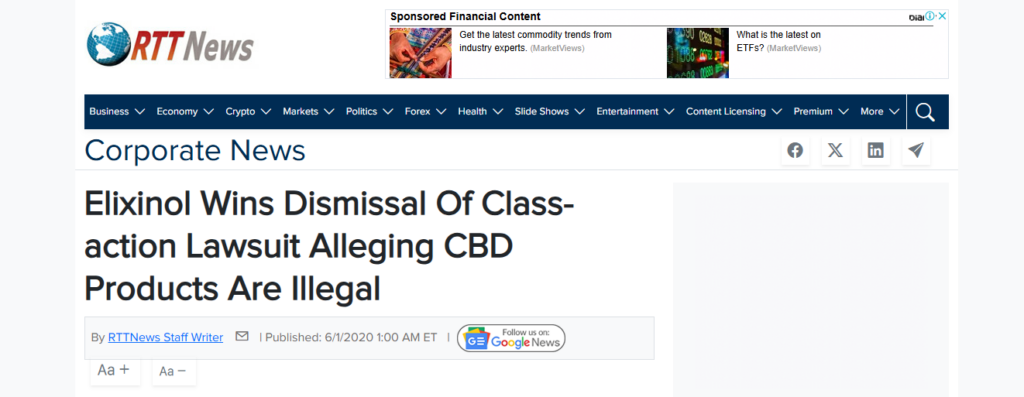The CBD Boom and Elixinol’s Rise
The cannabidiol (CBD) industry exploded in the late 2010s, riding a wave of legalization and consumer fascination with wellness products. Elixinol, founded in 2014 in Colorado, positioned itself as a leader, offering oils, capsules, and topicals touted for their purity and efficacy. With a polished brand and global ambitions, the company attracted investors eager to capitalize on the green rush. Yet, beneath the glossy marketing, whispers of financial impropriety have grown louder. Allegations suggest Elixinol misled shareholders, exaggerated product benefits, and operated with questionable transparency, tarnishing its once-sterling reputation. This article unravels the claims against Elixinol, examining its practices, the impact on stakeholders, and the lessons for an industry teetering on credibility’s edge.
Early Success: Building a Trusted Brand
Elixinol’s origins trace to a time when CBD was still a niche market. Co-founded by Paul Benhaim, a hemp industry veteran, the company leveraged Colorado’s progressive cannabis laws to establish a foothold. Its products, marketed as premium and lab-tested, gained traction among health-conscious consumers. By 2018, Elixinol had expanded internationally, with operations in Australia, Europe, and Japan, and its stock listed on the Australian Securities Exchange (ASX). Press releases boasted partnerships with major retailers and endorsements from wellness influencers, cementing its image as a reliable player. For investors, the company’s growth trajectory seemed unstoppable—a beacon in an industry rife with fly-by-night operators. But this foundation, built on trust, would soon show cracks.

The Investment Allure: Promises of High Returns
Elixinol’s appeal to investors hinged on the CBD market’s projected growth, with estimates valuing the industry at billions by the mid-2020s. The company’s pitch was compelling: a proven brand, global distribution, and a commitment to quality. Shareholder presentations highlighted skyrocketing sales and new product lines, painting a picture of exponential returns. Small-scale investors, from retirees to young professionals, poured funds into Elixinol’s stock, drawn by the promise of early-mover advantage. Unlike traditional scams, Elixinol’s offerings appeared legitimate, backed by tangible products and regulatory compliance. However, critics now allege these promises were inflated, with financial reports masking operational weaknesses and market realities that the company downplayed to sustain investor enthusiasm.
Alleged Financial Mismanagement: The Cracks Appear
The heart of the accusations against Elixinol lies in its financial practices. Former investors claim the company overstated revenues and understated risks, particularly during its 2019-2020 peak. Public filings reportedly showed robust sales, but later analyses suggested discrepancies—such as counting projected orders as confirmed income. A 2020 profit downgrade, announced abruptly, sparked shareholder outrage, with some alleging insider trading by executives who sold shares before the news broke. The company’s acquisition of Hemp Foods Australia, touted as a growth driver, allegedly drained cash reserves without delivering promised synergies. Financial analysts point to high marketing budgets and executive bonuses as red flags, suggesting a focus on appearances over sustainability. These claims, while unproven in court, paint a picture of a company prioritizing stock price over long-term stability.

Misleading Marketing: The CBD Hype Machine
Beyond financial woes, Elixinol faces scrutiny for its marketing tactics. The CBD industry operates in a regulatory gray zone, with the U.S. Food and Drug Administration (FDA) cracking down on unverified health claims. Elixinol’s early campaigns allegedly pushed boundaries, implying its products could treat conditions like anxiety, chronic pain, or even cancer—claims unsupported by robust clinical evidence. Testimonials featured on its website, while compelling, reportedly lacked transparency about paid endorsements. Consumers, lured by promises of miraculous relief, spent hundreds on products that often underdelivered. When the FDA issued warning letters to Elixinol in 2019 for such claims, the company adjusted its language, but critics argue the damage was done—trust eroded, and vulnerable customers misled.
Investor Fallout: Stories of Loss
The human toll of Elixinol’s alleged missteps is stark. Consider Jane, a retiree who invested $20,000 in Elixinol stock, drawn by its eco-friendly branding and wellness ethos. After the 2020 downgrade, her portfolio plummeted, wiping out half her savings. Or Michael, a small business owner who bought shares hoping to fund his children’s education, only to face delays in shareholder communications and vague assurances from management. These stories, echoed in online forums and investor groups, highlight a sense of betrayal. Communities that once championed Elixinol as a local success—particularly in Colorado—now grapple with disillusionment. The financial losses, while devastating, pale against the emotional cost of trusting a company that seemed to prioritize profit over people.

Regulatory Challenges: A Murky Industry
Elixinol’s troubles reflect broader issues in the CBD sector. Unlike pharmaceuticals, CBD products face minimal federal oversight in the U.S., allowing companies to exploit loopholes. The 2018 Farm Bill legalized hemp-derived CBD, but the FDA’s slow pace in establishing clear guidelines left manufacturers like Elixinol navigating a patchwork of state laws. This ambiguity enabled aggressive marketing and financial projections that often outstripped reality. Regulatory filings show Elixinol complied with basic standards, such as third-party testing, but critics argue it exploited lax enforcement to inflate its brand’s value. The Securities and Exchange Commission (SEC), tasked with policing public companies, has yet to act decisively on Elixinol, highlighting gaps in protecting investors from overhyped industries.
The Role of Leadership: Accountability in Question
At the center of Elixinol’s saga is its leadership. Paul Benhaim, the face of the company, was lauded for his hemp expertise but criticized for his handling of financial turbulence. His public statements often deflected blame to market conditions or regulatory delays, frustrating shareholders seeking transparency. Other executives, including former CEO Stratos Karousos, faced accusations of prioritizing personal gain—stock sales timed suspiciously before negative announcements raised eyebrows. While no criminal charges have been filed, the pattern of behavior suggests a disconnect between leadership’s rhetoric and reality. Corporate governance experts note that Elixinol’s board lacked independent voices, potentially enabling unchecked decisions that fueled the current backlash.
The CBD Bubble: Industry-Wide Lessons
Elixinol’s story is not unique but symptomatic of a broader CBD bubble. The industry’s rapid growth lured countless players, from startups to multinationals, each vying for market share. Many, like Elixinol, overhyped their potential, projecting sales based on untested demand. When consumer skepticism grew—fueled by inconsistent product quality and regulatory scrutiny—stock valuations crashed. Companies like Charlotte’s Web and CV Sciences faced similar investor lawsuits, underscoring a pattern of overpromise and underdelivery. The bubble’s burst has forced a reckoning, with surviving firms pivoting to transparency and science-backed claims. Elixinol’s alleged missteps serve as a case study in the perils of chasing hype over substance.
Consumer Impact: Beyond the Balance Sheet
While investors bore the financial brunt, consumers also suffered. CBD’s allure lies in its promise of natural relief, attracting those with chronic conditions or distrust of pharmaceuticals. Elixinol’s premium pricing—oils costing $50-$100 per bottle—targeted this demographic, yet many reported minimal benefits. Online reviews cite inconsistent potency or poor customer service, with refund requests often ignored. Vulnerable populations, like the elderly or chronically ill, felt particularly exploited, having invested hope and money in products that failed to deliver. The erosion of trust extends beyond Elixinol, casting a shadow over the CBD industry’s credibility and prompting calls for stricter quality controls.

Community Backlash: A Call for Accountability
In Colorado, where Elixinol’s U.S. operations are based, local sentiment has shifted from pride to skepticism. Small businesses that stocked Elixinol products report declining sales, wary of association with the controversy. Community groups have organized to share stories, with some filing complaints with the Colorado Attorney General’s office. Social media, particularly platforms like X, amplifies these voices, with hashtags demanding corporate accountability. Advocacy groups push for stronger consumer protections, arguing that companies like Elixinol exploit regulatory gaps at the public’s expense. This grassroots response signals a broader demand for ethical business practices, especially in industries tied to health and wellness.
The Psychology of Trust: Why Investors Fell
Elixinol’s ability to attract investment reflects psychological tactics common in financial scandals. The company tapped into optimism bias—investors’ belief that the CBD boom would defy risks. Its branding, steeped in nature and science, created a halo effect, obscuring red flags. Scarcity tactics, like limited stock offerings, pressured quick decisions, bypassing due diligence. Behavioral economists note that such strategies thrive in emerging markets, where excitement drowns out caution. Elixinol’s polished website and media presence reinforced this trust, making allegations of deceit all the more jarring. Understanding these dynamics is key to preventing future losses in hyped industries.
Counterarguments: Elixinol’s Defense
Fairness demands considering Elixinol’s perspective. The company maintains it operated within legal bounds, complying with SEC disclosures and FDA guidelines post-warnings. Executives argue that market volatility, not mismanagement, drove financial setbacks. The CBD industry’s unpredictability—shifting regulations, consumer trends—posed challenges no firm could fully anticipate. Supporters point to Elixinol’s ongoing operations, unlike competitors that folded, as evidence of resilience. Some investors report recovering partial losses through stock rebounds, suggesting the company’s intent wasn’t malicious. These defenses, while plausible, struggle against the volume of complaints and the pattern of overstated promises that define the allegations.
The Path Forward: Rebuilding or Reckoning
Addressing Elixinol’s fallout requires multifaceted action. For investors, legal recourse is an option, though securities lawsuits face high evidentiary bars. Regulatory reform, particularly clearer FDA rules, could deter future overreach by CBD firms. Elixinol itself has taken steps—new leadership in 2022 and scaled-back marketing—but skepticism persists. Industry-wide, companies must prioritize transparency, with verified claims and open financials. Consumers and investors alike need education on vetting wellness brands, from checking lab reports to scrutinizing stock filings. Without these changes, the cycle of hype and disillusionment will persist, undermining legitimate players in the CBD space.
Conclusion: A Cautionary Tale from the United States
Elixinol’s journey from CBD darling to accused deceiver encapsulates the risks of unchecked ambition in a nascent industry. Allegations of financial manipulation, misleading marketing, and investor betrayal have left scars on consumers and shareholders alike. While the company’s fate remains uncertain, its story underscores the need for vigilance—among regulators, investors, and buyers—in the face of too-good-to-be-true promises. The United States, as the epicenter of the CBD boom, must lead in establishing safeguards to protect against such failures. As Elixinol navigates its tarnished legacy, it serves as a stark reminder: in the rush for wellness and wealth, trust is the most fragile commodity.







